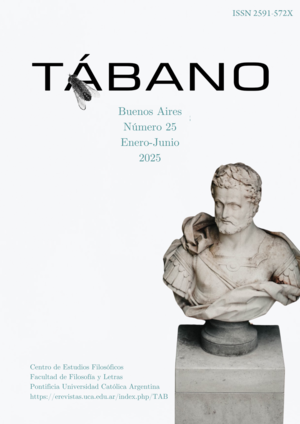Deleuze, axiomatized. Alain Badiou’s formalization of the upsurge
DOI:
https://doi.org/10.46553/tab.25.2025.e5Keywords:
Badiou, Deleuze, Event, Multiplicity, AxiomatizationAbstract
This work aims to analyse Alain Badiou’s critique of Gilles Deleuze’s Logic of Sense and theory of the event in Logics of Worlds. This is done under the hypothesis that Badiou axiomatizes Deleuze to mathematically scrutinize the mainframe of Logic of Sense and finally break away with the empiricist approach towards the appearance of the bodies. In doing so, Badiou is able to formalize the resurgence of multiplicities per operation of the inconsistent multiple. Henceforth, this work focuses on Badiou’s employment of Deleuzian transcendentalism as an argumentative device to purport the formal condition of the appearance of bodies or multiplicities, as the vitalist analytic of the undifferentiated bodies is considered refuted.
Downloads
References
Badiou, A. (1992). Conditions. Éditions de Seuil.
Badiou, A. (1998). Court traité d’ontologie transitoire. Éditions de Seuil.
Badiou, A. (1999). Deleuze: The Clamour of Being. University of Minnesota Press.
Badiou, A. (2007). Being and Event. Continuum. DOI: https://doi.org/10.5040/9781350252035
Badiou, A. (2008). Logis of Worlds. Continuum.
Badiou, A. (2014). Mathematics of the Transcendental. Bloomsbury. DOI: https://doi.org/10.5040/9781474292924
Badiou, A. (2022). The Immanence of Truths. Bloomsbury Academic. DOI: https://doi.org/10.5040/9781350115323
Bisso, E. (2013). Lacan con Deleuze: lógicas del sentido. Revista Affectio societatis, vol. 10, n. 18, pp. 2-16. DOI: https://doi.org/10.17533/udea.affs.15593
Crockett, C. (2013). Deleuze Beyond Badiou: Ontology, Multiplicity and Event. Columbia University Press.
Deleuze, G. (1990). The Logic of Sense. Columbia University Press.
Deleuze, G. (2001). Difference and Repetition. Continuum.
Hasegawa, T. (2020). Le symboliqu,e une structure plus profonde que la réalité et son apparition. Résonances, n. 11, pp. 17-28.
Jacob, A. (1969). Sens, énoncé, communication. L’homme et la société, n. 14, pp. 193-199. DOI: https://doi.org/10.3406/homso.1969.1764 DOI: https://doi.org/10.3406/homso.1969.1764
Lecercle, J.J. (2005). Il y a l’événément et événément. Polysèmes, n. 7, pp. 249-264. DOI: https://doi.org/10.4000/polysemes.1687
León, E. (2019). Multiplicidad, acontecimiento y ontología en Badiou y Deleuze. Eikasia, n. 90, pp. 53-78. DOI: https://doi.org/10.57027/eikasia.90.602
May, T. (2004). Badiou and Deleuze on the one and the many. En Hallward, P. (ed.) (2004). Think again: Alain Badiou and the future of philosophy. Continuum.
Meillassoux, Q. (2011). History and Event in Alain Badiou. Parrhesia, n. 12, pp. 1-11.
Roffe, J. (2012). Badiou’s Deleuze. McGill-Queen's University Press. DOI: https://doi.org/10.1515/9780773594685
Ronald Shaw, I. (2010). Sites, truths and the logics of worlds: Alain Badiou and human geography. Transactions, n. 35, pp. 431-442. DOI: https://doi.org/10.1111/j.1475-5661.2010.00385.x
Simont, J. (2002). Critique de la représentation et ontologie chez Deleuze et Badiou. Autour du “virtuel”. En Charles Ramond (éd.) (2002). Alain Badiou. Penser le multiple (pp. 457-476). L’Harmattan.
Vartabedian, B. (2018). Multiplicity and Ontology in Deleuze and Badiou. Palgrave Macmillan. DOI: https://doi.org/10.1007/978-3-319-76837-3
Downloads
Published
How to Cite
Issue
Section
License
Copyright (c) 2025 Matti Felipe A.

This work is licensed under a Creative Commons Attribution-NonCommercial-ShareAlike 4.0 International License.


